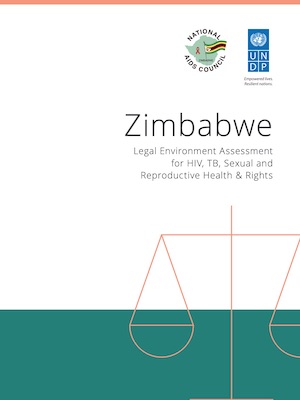Human Rights
Introduction to HIV, TB and Human Rights in Zimbabwe
The Zimbabwe Legal Environment Assessment for HIV, TB and Sexual and Reproductive Health & Rights provides a relevant and recent introduction to Human Rights;
-
 Zimbabwe legal environment assessment for HIV, TB Legal Environment Assessment for HIV, TB, Sexual and Reproductive Health & Rights in Zimbabwe.PDF 1.7 MB
Zimbabwe legal environment assessment for HIV, TB Legal Environment Assessment for HIV, TB, Sexual and Reproductive Health & Rights in Zimbabwe.PDF 1.7 MB
Guaranteeing the rights of citizens is a key step towards attaining the SDGs for any country. It is also both a legal and moral responsibility of every government. Hence a human rights-based approach should be at the centre of heath legal and policy formulation and the implementation of programmes for all people within the country.
People living with and affected by HIV are among those people whose rights should be guaranteed by the State, owing to their increased vulnerability as a result of their HIV and other related status. However, people living with HIV and TB, vulnerable and key populations, including young key populations are often stigmatized in society in a wide range of community contexts, including legal and structural, the family and immediate community, workplace, health services, religion and the media. Stigma enhances discrimination, violating fundamental human rights to fair and equal treatment and risking the health and development rights of these populations.
Thus, an efficient, effective and sustainable HIV, TB and health response system in any country requires full protection of fundamental human rights as a basic practice. This is only possible where a country has an enabling legal and policy environment for people living with and impacted by HIV and TB as well as vulnerable and key populations, including young key populations.
Focus on disadvantaged populations
Disadvantage and marginalization serve to exclude certain populations in societies from enjoying good health. Three of the world’s most fatal communicable diseases – malaria, HIV/AIDS and tuberculosis – disproportionately affect the world’s poorest populations, and in many cases are compounded and exacerbated by other inequalities and inequities including gender, age, sexual orientation or gender identity and migration status. Conversely the burden of non-communicable diseases – often perceived as affecting high-income countries – is increasing disproportionately among lower-income countries and populations, and is largely associated with lifestyle and behaviour factors as well as environmental determinants, such as safe housing, water and sanitation that are inextricably linked to human rights.



